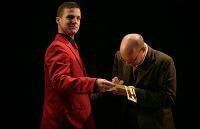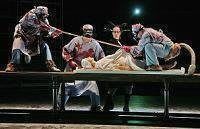John Clifford's Faust is a brave attempt to tackle not only an adaptation of Goethe's most famous pair of works but also a modernisation of their story, complete with comic references and all manners of subtexts. The adaptation is brilliantly done and is surprising in how much of the original plot has been left wholly intact.
Part 1 tells the story of Professor Faust (Paul Brennen), a disillusioned academic embittered after having spent his life learning from books only to have decided that this knowledge is useless. In order to sate his hunger to know all, he makes a wager with the devil, played with aplomb by Dugald Bruce Lockhart. Should he ever quench his thirst for knowledge or find one moment so great that he would wish to remain there forever, then he would lose his soul. This bargain made, Satan leads Faust on a journey of sensual pleasures, visceral experiences and ultimately brings him to fall in love with Gretchen, a poverty-stricken council estate dweller. Through his love of her, and his own carelessness Faust brings tragedy upon her entire family.
Part 2 on the other hand is a far different work. The story continues as we follow Faust, soon separated from the Devil, back to ancient Greece, through a curiously swift marriage to Helen of Troy. Again, when tragedy unfolds; we are swept forwards through time, to see his becoming a powerful general, then onward to becoming a maniacal fascist holding a war to tame the tide and finally the ultimate resolution of the wager.
There is an obvious disparity in both style and pacing of the two parts. The first is a more traditional narrative whilst the other is more chaotic and abstract. This can be put down to Goethe's having written Part 2 as a Closet Drama and never intended it to be performed onstage. Adding to this is the far more heavy adaptation in Part 2, the narrative being butchered considerably, but mostly in its favour. As such it comes across as a somewhat irreverent and staccato piece, lacking in the cathartic emotions brought about during Part 1.
The cast is uniformly excellent, working under the sharp direction of Mark Thomson. There are standout performances from Dugald Bruce Lockhart and Ruth Connell as both the piteous Gretchen and world-weary Helen of Troy. Brennen's Faust also deserves mention as he effectively carries the audience on his shoulders throughout the course of the play, growing ever more unlovable and arrogant. The remainder of the cast manages to show aptitudes for music, dance, song and everything else thrown at them without ever breaking stride.
A few niggling problems occur with Clifford's attempt to tie the concept of transgender issues and the notion of Divine femininity. This is barely touched on in Part 1, but the two occasions it arises feel shoehorned into the rest of the story, largely because we are never given any reason or explanation as to how it is relevant to the situation.
The more elaborate gender indecision in Part 2 works better but is met with an uncomfortable payoff, and is maintained through the gender altering of the narrating Poet character. It has a preaching quality that is at odds with the socio-political messages that otherwise occur throughout.


